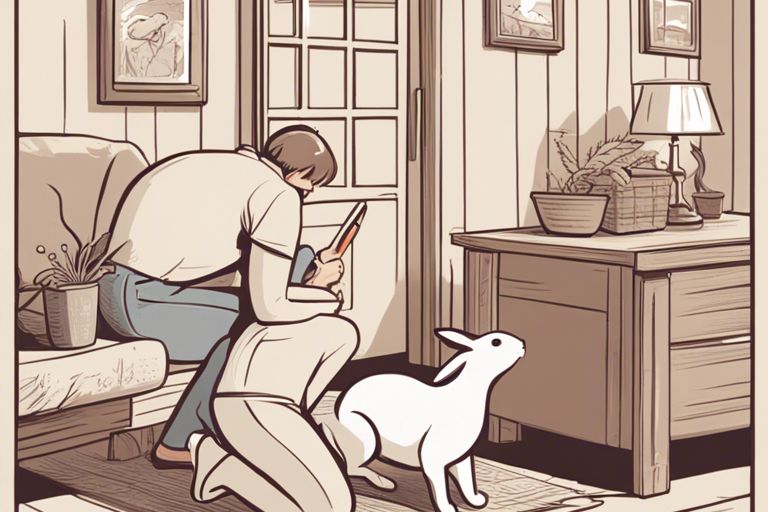Recognizing the signs of dehydration in your rabbit is crucial in ensuring their well-being. Dehydration can be a serious and potentially life-threatening condition for rabbits, so it’s important to be able to identify the symptoms quickly. In this blog post, you will learn about the key indicators of dehydration in rabbits, as well as some preventative measures you can take to keep your pet hydrated and healthy. By the end of this article, you will have a clear understanding of how to assess and address dehydration in your rabbit.
Recognizing Dehydration in Rabbits
By understanding and recognizing the signs of dehydration in your rabbit, you can take quick action to address the issue before it becomes more serious. Dehydration can be a serious health concern in rabbits, so it’s important to be able to identify the signs and symptoms.
Common Signs and Symptoms
When your rabbit is dehydrated, you may notice a variety of symptoms that indicate a lack of adequate hydration. Some common signs to look out for include dry or tacky mucous membranes, sunken eyes, lethargy, decreased urination, and loss of skin elasticity. If you notice these symptoms in your rabbit, it’s important to take immediate steps to rehydrate them and seek veterinary care if necessary.
Dehydration Tests You Can Perform
If you suspect that your rabbit may be dehydrated, you can perform a few simple tests to gauge their hydration levels. One method is to gently pinch the skin on the back of your rabbit’s neck and then release it. If the skin snaps back into place immediately, your rabbit is likely well hydrated. However, if the skin retains a pinched shape or takes longer to return to its normal position, this could indicate dehydration. You can also monitor your rabbit’s urine output, as decreased urination can be a sign of dehydration.
Causes of Dehydration in Rabbits
Some rabbits are more prone to dehydration due to various factors that can impact their water intake and retention. It’s important to be aware of these potential causes in order to prevent dehydration in your pet rabbit.
Environmental Factors
Environmental factors such as extreme heat, humidity, or lack of access to fresh water can contribute to dehydration in rabbits. Make sure your rabbit has constant access to clean, fresh water, especially during warmer months. Additionally, if your rabbit is housed outdoors, ensure they have a cool, shaded area to escape the heat. In extreme temperatures, consider bringing your rabbit indoors to protect them from dehydration. Assume that any extreme changes in weather or environment can affect your rabbit’s water consumption and take appropriate measures to ensure their well-being.
Health-Related Issues
Various health-related issues can also lead to dehydration in rabbits. Illnesses, digestive problems, or urinary tract issues can cause your rabbit to lose more water than usual. It’s important to monitor your rabbit for any signs of illness and seek veterinary attention if you notice any changes in their behavior or appearance. Additionally, older rabbits may be more prone to dehydration due to age-related health issues. Ensure that your rabbit receives regular check-ups with a veterinarian to address any potential health concerns.
Treating and Preventing Dehydration
Despite your best efforts, your rabbit may still become dehydrated at some point. It’s important to be prepared and know how to address this issue promptly. Here are some strategies for treating and preventing dehydration in your rabbit.
Immediate Actions to Take
If you suspect that your rabbit is dehydrated, it’s crucial to take immediate action. Offer your rabbit fresh water and observe if they are drinking. If you notice signs of severe dehydration, such as weakness, sunken eyes, or lethargy, seek veterinary assistance right away. Your veterinarian may administer IV fluids to quickly rehydrate your rabbit. Prompt action can be life-saving in severe cases of dehydration, so don’t hesitate to seek professional help if needed.
Long-term Strategies for Hydration
To prevent dehydration in the first place, ensure that your rabbit always has access to fresh, clean water. Regularly change the water and clean the water bottle or bowl to prevent bacterial growth. Offer a variety of fresh vegetables and a small amount of fruit to provide additional fluids in your rabbit’s diet. Monitor your rabbit’s water intake and urine output closely to keep track of their hydration levels. Regularly weighing your rabbit can also help you detect any changes in their hydration status. If you notice any signs of dehydration, consult your veterinarian for further guidance on adjusting your rabbit’s diet and hydration routine.
When to Seek Veterinary Care
After evaluating your rabbit and noticing signs of dehydration, it is important to know when to seek veterinary care. If you have attempted to rehydrate your rabbit at home and are not seeing any improvement, or if your rabbit’s condition worsens, it is crucial to contact your veterinarian as soon as possible. Even if you are unsure whether your rabbit is dehydrated, it is always best to seek professional advice to ensure the well-being of your pet.
Situations Requiring Professional Assistance
If you notice that your rabbit is severely dehydrated, exhibiting extreme lethargy, weakness, or inability to drink despite your attempts to rehydrate them, it is essential to seek professional assistance immediately. Additionally, if your rabbit is showing signs of severe illness or dehydration, such as sunken eyes, dry mouth, or limited urine output, a veterinary assessment is crucial in determining the underlying cause and providing the necessary treatment.
What to Expect at the Vet
When you take your rabbit to the vet for dehydration, the veterinary team will assess your rabbit’s overall condition, including hydration levels, and may perform diagnostic tests to identify any underlying health issues. Treatment may include fluid therapy, addressing any underlying illnesses, or providing supportive care to help your rabbit recover. Your vet will provide you with guidance on how to continue caring for your rabbit at home and will schedule any necessary follow-up appointments to monitor their progress.














